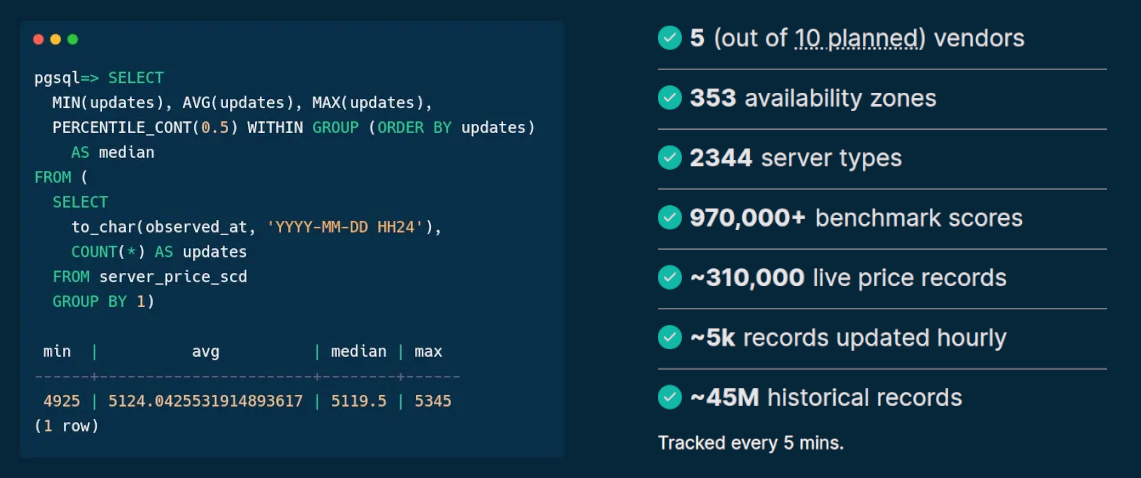flowchart TD
A[start] --> B(hello)
B --> C[end]
Magically Right Size the Compute Resources Dedicated to Your AI/ML Workloads
Gergely Daroczi
2025-09-02

Outerbounds Office Hours
with Spare Cores
Gergely Daroczi
Sep 2, 2025
Slides: sparecores.com/talks
Press Space or click the green arrow icons to navigate the slides ->
>>> from sparecores import badges
- Vendor independent, open-source project
- Funded by NGI Search (EU consortium under Horizon Europe)
- Accepted into the NVIDIA Inception Program
- Beneficiary of cloud credits from 5 vendors (overall ~$100k)
- 10+ conference talks in 6 countries (e.g. Berlin Buzzwords, KCD)
- Featured by The Pragmatic Engineer in Oct 2024
- Jeff Barr (Chief Evangelist at AWS) on our Reddit post:
This was awesome, thanks for sharing.
>>> from sparecores import intro
- Open-source tools, database schemas and documentation to inspect and inventory cloud vendors and their offerings, including pricing and measured performance via benchmark workloads.

>>> from sparecores import intro
- Open-source tools, database schemas and documentation to inspect and inventory cloud vendors and their offerings, including pricing and measured performance via benchmark workloads.
- Managed infrastructure, databases, APIs, SDKs, and web applications to make this data publicly accessible.
- Open-source helpers to select, start and manage instances in your own environment.
- Open-source Python/R packages and workflow orchestration extensions (e.g. Metaflow) to track resource usage and cost of DS/ML/AI jobs. Open-source tooling to right-size instances.
- Add-on services to scale data science workflows, even without direct vendor engagement.
>>> import 
Workflow orchestration for real-life ML, AI, and DS projects.
- started at Netflix
- open-source (since 2019)
- supports Python and R
- maintained by Netflix and Outerbounds
- human-centric
- reproducible by design
- scalable
>>> from metaflow import tutorial
from metaflow import FlowSpec, step
class HelloFlow(FlowSpec):
@step
def start(self):
print("HelloFlow is starting.")
self.next(self.hello)
@step
def hello(self):
print("Metaflow says: Hi!")
self.next(self.end)
@step
def end(self):
print("HelloFlow is all done.")
if __name__ == "__main__":
HelloFlow()>>> from metaflow import tutorial
from metaflow import FlowSpec, step
class HelloFlow(FlowSpec):
@step
def start(self):
print("HelloFlow is starting.")
self.next(self.hello)
@step
def hello(self):
print("Metaflow says: Hi!")
self.next(self.end)
@step
def end(self):
print("HelloFlow is all done.")
if __name__ == "__main__":
HelloFlow()>>> from DnD import dices

>>> from metaflow import dices
flowchart TD
A[start] -. dice <br> rolls .-> B(roll)
B -. dice <br> rolls <br> dices ..-> C[end]
from random import sample, randint
from metaflow import FlowSpec, step
class DiceRollFlow(FlowSpec):
# D3, D4, D6, D8, D10, D12, ...
DICES = [3, 4, 6, 8, 10, 12, 100]
@step
def start(self):
self.dice = sample(self.DICES, 1)[0]
self.rolls = sample(range(3), 1)[0] + 1
self.next(self.roll)
@step
def roll(self):
self.dices = [randint(1, self.dice) for _ in range(self.rolls)]
self.next(self.end)
@step
def end(self):
print(f"Rolled {self.rolls} times with a {self.dice} sided dice: {self.dices}")
if __name__ == "__main__":
DiceRollFlow()>>> from metaflow import dices
flowchart TD
A[start] -. dice <br> rolls .-> B(roll)
B -. dice <br> rolls <br> dices ..-> C[end]
from random import sample, randint
from metaflow import FlowSpec, step
class DiceRollFlow(FlowSpec):
# D3, D4, D6, D8, D10, D12, ...
DICES = [3, 4, 6, 8, 10, 12, 100]
@step
def start(self):
self.dice = sample(self.DICES, 1)[0]
self.rolls = sample(range(3), 1)[0] + 1
self.next(self.roll)
@step
def roll(self):
self.dices = [randint(1, self.dice) for _ in range(self.rolls)]
self.next(self.end)
@step
def end(self):
print(f"Rolled {self.rolls} times with a {self.dice} sided dice: {self.dices}")
if __name__ == "__main__":
DiceRollFlow()>>> from metaflow import dices

>>> from metaflow import dices
>>> from metaflow import Flow
>>> print(run := Flow("DiceRollFlow").latest_successful_run)
Run('DiceRollFlow/1749762602890590')
>>> run.created_at
datetime.datetime(2025, 9, 24, 23, 10, 2, 891000)
>>> run.data
<MetaflowData: dices, rolls, name, dice>
>>> run.data.dices
[5, 2, 2]
>>> list(run.steps())
[Step('DiceRollFlow/1749762602890590/end'), Step('DiceRollFlow/1749762602890590/roll'), Step('DiceRollFlow/1749762602890590/start')]
>>> step = next(run.steps())
>>> step.task.metadata
[Metadata(name='user', value='daroczig', created_at=1749762604068, type='user', task=Task('DiceRollFlow/1749762602890590/end/3')), ...
>>> step.task.stdout
'Rolled 3 time(s) with a 10 sided dice: [5, 2, 2]\n'
>>> step.task.artifacts.dices.data
[5, 2, 2]>>> from metaflow import more
flowchart TD
A[start] --> B1(fitA)
A[start] --> B2(fitB)
B1 --> C[eval]
B2 --> C[eval]
C --> D[end]
class ModelingFlow(FlowSpec):
@step
def start(self):
self.data = load_data()
self.next(self.fitA, self.fitB)
@step
def fitA(self):
self.model = fit(self.data, model='A')
self.next(self.eval)
@step
def fitB(self):
self.model = fit(self.data, model='B')
self.next(self.eval)
@step
def eval(self, inputs):
self.best = max((i.model.score, i.model)
for i in inputs)[1]
self.next(self.end)
@step
def end(self):
print('done!')>>> from metaflow import more
flowchart TD
A[start] -- data --> B1(fitA)
A[start] -- data --> B2(fitB)
B1 -. data<br>model .-> C[eval]
B2 -. data<br>model .-> C[eval]
C -- data<br>best --> D[end]
class ModelingFlow(FlowSpec):
@step
def start(self):
self.data = load_data()
self.next(self.fitA, self.fitB)
@step
def fitA(self):
self.model = fit(self.data, model='A')
self.next(self.eval)
@step
def fitB(self):
self.model = fit(self.data, model='B')
self.next(self.eval)
@step
def eval(self, inputs):
self.best = max((i.model.score, i.model)
for i in inputs)[1]
self.next(self.end)
@step
def end(self):
print('done!')And conditional and recursive steps since Metaflow 2.18!
>>> from metaflow import venv
flowchart TD
style B2 fill:#eab308
A[start] --> B1(fitA)
A[start] --> B2(fitB)
B1 --> C[eval]
B2 --> C[eval]
C --> D[end]
class ModelingFlow(FlowSpec):
@step
def start(self):
self.data = load_data()
self.next(self.fitA, self.fitB)
@step
def fitA(self):
self.model = fit(self.data, model='A')
self.next(self.eval)
@pypi(python='3.10.11', packages={'scikit-learn': '1.7'})
@step
def fitB(self):
self.model = fit(self.data, model='B')
self.next(self.eval)
@step
def eval(self, inputs):
self.best = max((i.model.score, i.model)
for i in inputs)[1]
self.next(self.end)
@step
def end(self):
print('done!')>>> from metaflow import cloud
flowchart TD
subgraph AWS Batch
B1(fitA)
B2(fitB)
end
A[start] .-> B1
A[start] .-> B2
B1 .-> C[eval]
B2 .-> C[eval]
C --> D[end]
class ModelingFlow(FlowSpec):
@step
def start(self):
self.data = load_data()
self.next(self.fitA, self.fitB)
@batch(cpu=32, memory=64)
@step
def fitA(self):
self.model = fit(self.data, model='A')
self.next(self.eval)
@batch(cpu=4, memory=16, gpu=1)
@step
def fitB(self):
self.model = fit(self.data, model='B')
self.next(self.eval)
@step
def eval(self, inputs):
self.best = max((i.model.score, i.model)
for i in inputs)[1]
self.next(self.end)
@step
def end(self):
print('done!')>>> import resource_tracker
- Lightweight (zero-dependency*) Python package
- Supports Python 3.9+
- Monitors system-level and process-level resource usage
- Tracks CPU, memory, GPU/VRAM, network, storage & more
- Ease of use, minimal setup
- Runs in the background, non-blocking
- Framework extensions (e.g. Metaflow)
* No dependencies on Linux;
psutil on other OS.
>>> import resource_tracker
Installation:
>>> resource_tracker.report().browse()
>>> ResourceTracker.system_metrics
>>> print(tracker.system_metrics)
TinyDataFrame with 221 rows and 21 columns:
timestamp | processes | utime | stime | cpu_usage | memory_free | memory_used | memory_buffers | memory_cached | memory_active | memory_inactive | disk_read_bytes | disk_write_bytes | disk_space_total_gb | disk_space_used_gb | disk_space_free_gb | net_recv_bytes | net_sent_bytes | gpu_usage | gpu_vram | gpu_utilized
-------------+-----------+-------+-------+-----------+-------------+-------------+----------------+---------------+---------------+-----------------+-----------------+------------------+---------------------+--------------------+--------------------+----------------+----------------+-----------+----------+-------------
1756711946.0 | 720.0 | 0.62 | 0.41 | 1.0303 | 18888932.0 | 38098620.0 | 3612.0 | 8555708.0 | 25858216.0 | 110860.0 | 872448.0 | 274432.0 | 3699.99 | 2600.86 | 1099.13 | 4627.0 | 3251.0 | 0.19 | 1610.0 | 1.0
1756711947.0 | 718.0 | 0.56 | 0.51 | 1.0699 | 18878644.0 | 38108908.0 | 3612.0 | 8555708.0 | 25858092.0 | 110860.0 | 53248.0 | 5705728.0 | 3699.99 | 2600.85 | 1099.14 | 4666.0 | 952.0 | 0.18 | 1610.0 | 1.0
1756711948.0 | 718.0 | 0.65 | 0.41 | 1.06 | 18887904.0 | 38099648.0 | 3612.0 | 8555708.0 | 25873876.0 | 110860.0 | 499712.0 | 0.0 | 3699.99 | 2600.85 | 1099.14 | 4141.0 | 749.0 | 0.17 | 1610.0 | 1.0
1756711949.0 | 718.0 | 0.56 | 0.31 | 0.87 | 18893768.0 | 38093784.0 | 3612.0 | 8555708.0 | 25873732.0 | 110860.0 | 8192.0 | 0.0 | 3699.99 | 2600.85 | 1099.14 | 5230.0 | 3534.0 | 0.13 | 1610.0 | 1.0
1756711950.0 | 717.0 | 0.6 | 0.43 | 1.0301 | 18872532.0 | 38112844.0 | 3612.0 | 8557884.0 | 25876444.0 | 110860.0 | 8192.0 | 0.0 | 3699.99 | 2600.85 | 1099.14 | 11204.0 | 10237.0 | 0.14 | 1611.0 | 1.0
1756711951.0 | 717.0 | 0.67 | 0.45 | 1.1199 | 18877492.0 | 38110060.0 | 3612.0 | 8555708.0 | 25874972.0 | 110860.0 | 0.0 | 0.0 | 3699.99 | 2600.85 | 1099.14 | 4605.0 | 2372.0 | 0.12 | 1611.0 | 1.0
1756711952.0 | 722.0 | 0.61 | 0.41 | 1.0201 | 18866980.0 | 38120572.0 | 3612.0 | 8555708.0 | 25876556.0 | 110860.0 | 20480.0 | 3383296.0 | 3699.99 | 2600.85 | 1099.14 | 4569.0 | 3845.0 | 0.17 | 1611.0 | 1.0
1756711953.0 | 718.0 | 1.07 | 0.49 | 1.56 | 18883100.0 | 38101332.0 | 3612.0 | 8558828.0 | 25880244.0 | 110860.0 | 385024.0 | 606208.0 | 3699.99 | 2600.85 | 1099.14 | 27694.0 | 14736.0 | 0.32 | 1625.0 | 1.0
1756711954.0 | 718.0 | 1.06 | 0.44 | 1.5001 | 18872284.0 | 38110084.0 | 3612.0 | 8560892.0 | 25891068.0 | 110860.0 | 90112.0 | 0.0 | 3699.99 | 2600.85 | 1099.14 | 17429.0 | 16417.0 | 0.17 | 1638.0 | 1.0
1756711955.0 | 717.0 | 1.93 | 0.46 | 2.3897 | 18870824.0 | 38111536.0 | 3612.0 | 8560900.0 | 25878008.0 | 110860.0 | 692224.0 | 262144.0 | 3699.99 | 2600.85 | 1099.14 | 97172.0 | 114005.0 | 0.23 | 1656.0 | 1.0
...>>> ResourceTracker.process_metrics
>>> print(tracker.process_metrics)
TinyDataFrame with 221 rows and 12 columns:
timestamp | pid | children | utime | stime | cpu_usage | memory | read_bytes | write_bytes | gpu_usage | gpu_vram | gpu_utilized
-------------+-----------+----------+-------+-------+-----------+---------+------------+-------------+-----------+----------+-------------
1756711946.0 | 1542538.0 | 4.0 | 0.07 | 0.08 | 0.15 | 84612.0 | 0.0 | 0.0 | 0.0 | 0.0 | 0.0
1756711947.0 | 1542538.0 | 3.0 | 0.09 | 0.17 | 0.26 | 74270.0 | 0.0 | 0.0 | 0.0 | 0.0 | 0.0
1756711948.0 | 1542538.0 | 4.0 | 0.19 | 0.06 | 0.25 | 99062.0 | 945664.0 | 0.0 | 0.0 | 0.0 | 0.0
1756711949.0 | 1542538.0 | 3.0 | 0.07 | 0.1 | 0.17 | 87491.0 | 0.0 | 0.0 | 0.0 | 0.0 | 0.0
1756711950.0 | 1542538.0 | 4.0 | 0.09 | 0.13 | 0.22 | 87462.0 | 0.0 | 0.0 | 0.0 | 0.0 | 0.0
1756711951.0 | 1542538.0 | 4.0 | 0.02 | 0.06 | 0.08 | 99156.0 | 0.0 | 0.0 | 0.0 | 0.0 | 0.0
1756711952.0 | 1542538.0 | 4.0 | 0.06 | 0.13 | 0.19 | 99163.0 | 0.0 | 0.0 | 0.0 | 0.0 | 0.0
1756711953.0 | 1542538.0 | 4.0 | 0.04 | 0.1 | 0.14 | 99198.0 | 0.0 | 0.0 | 0.0 | 0.0 | 0.0
1756711954.0 | 1542538.0 | 4.0 | 0.04 | 0.09 | 0.13 | 98916.0 | 0.0 | 0.0 | 0.0 | 0.0 | 0.0
1756711955.0 | 1542538.0 | 4.0 | 0.04 | 0.12 | 0.16 | 99333.0 | 0.0 | 0.0 | 0.0 | 0.0 | 0.0
...>>> ResourceTracker.get_combined_metrics
>>> from rich import print as pp
>>> pp(tracker.get_combined_metrics(human_names=True)[0])
{
'Timestamp': 1756711946.0,
'System processes': 720.0,
'System CPU time (user)': 0.62,
'System CPU time (system)': 0.41,
'System CPU usage': 1.0303,
'System free memory': 18888932.0,
'System used memory': 38098620.0,
'System memory buffers': 3612.0,
'System memory page/file cached': 8555708.0,
'System active memory': 25858216.0,
'System inactive memory': 110860.0,
'System disk read': 872448.0,
'System disk write': 274432.0,
'System disk space total': 3699.99,
'System disk space used': 2600.86,
'System disk space free': 1099.13,
'System inbound network traffic': 4627.0,
'System outbound network traffic': 3251.0,
'System GPU usage': 0.19,
'System VRAM used': 1610.0,
'System GPUs in use': 1.0,
'Process PID': 1542538.0,
'Process children': 4.0,
'Process CPU time (user)': 0.07,
'Process CPU time (system)': 0.08,
'Process CPU usage': 0.15,
'Process memory usage': 84612.0,
'Process disk read': 0.0,
'Process disk write': 0.0,
'Process GPU usage': 0.0,
'Process VRAM used': 0.0,
'Process GPUs in use': 0.0
}>>> ResourceTracker.stats
>>> pp(tracker.stats())
defaultdict(<class 'dict'>, {
'process_cpu_usage':
{'mean': 0.14,
'max': 0.26},
'process_memory':
{'mean': 94373.43,
'max': 109308.0},
'process_gpu_usage':
{'mean': 0.0,
'max': 0.0},
'process_gpu_vram':
{'mean': 0.0,
'max': 0.0},
'process_gpu_utilized':
{'mean': 0.0,
'max': 0.0},
'system_disk_space_used_gb':
{'max': 2600.87},
'system_net_recv_bytes':
{'sum': 111299615.0},
'system_net_sent_bytes':
{'sum': 103073415.0},
'timestamp': {'duration': 221.0}
})![]()
>>> ResourceTracker.recommendations
Super simple algorithm:
cpu: average CPU usage of the process(es)memory: maximum memory usage of the process(es) with a 20% buffergpu: maximum number of GPUs used by the process(es)vram: maximum VRAM usage of the process(es) with a 20% buffer
>>> ResourceTracker.recommendations
>>> print(ResourceTracker.recommend_resources.__doc__)
Recommend optimal resource allocation based on the measured resource tracker data.
The recommended resources are based on the following rules:
- target average CPU usage of the process(es)
- target maximum memory usage of the process(es) with a 20% buffer
- target maximum number of GPUs used by the process(es)
- target maximum VRAM usage of the process(es) with a 20% buffer
Args:
historical_stats: Optional list of historical statistics (as returned by [resource_tracker.ResourceTracker.stats][])
to consider when making recommendations. These will be combined with the current stats.
Returns:
A dictionary containing the recommended resources (cpu, memory, gpu, vram).>>> ResourceTracker.recommendations
>>> pp(tracker.recommend_server())
{
'vendor_id': 'aws',
'server_id': 't4g.nano',
'name': 't4g.nano',
'api_reference': 't4g.nano',
'display_name': 't4g.nano',
'description': 'Burstable performance [AWS Graviton processors] Gen4 nano',
'family': 't4g',
'vcpus': 2,
'hypervisor': 'nitro',
'cpu_allocation': 'Burstable',
'cpu_cores': 2,
'cpu_speed': 2.5,
'cpu_architecture': 'arm64',
'cpu_manufacturer': 'AWS',
'cpu_family': 'ARMv8',
'cpu_model': 'Neoverse-N1',
'cpu_l1_cache': 262144,
'cpu_l2_cache': 2097152,
'cpu_l3_cache': 33554432,
'cpu_flags': ['fp', 'asimd', 'evtstrm', 'aes', 'pmull', 'sha1', 'sha2', 'crc32', 'atomics', 'fphp', 'asimdhp', 'cpuid', 'asimdrdm', 'lrcpc', 'dcpop', 'asimddp', 'ssbs'],
'cpus': [],
'memory_amount': 512,
'memory_generation': None,
'memory_speed': None,
'memory_ecc': None,
'gpu_count': 0,
'gpu_memory_min': None,
'gpu_memory_total': None,
'gpu_manufacturer': None,
'gpu_family': None,
'gpu_model': None,
'gpus': [],
'storage_size': 0,
'storage_type': None,
'storages': [],
'network_speed': 0.032,
'inbound_traffic': 0.0,
'outbound_traffic': 0.0,
'ipv4': 0,
'status': 'active',
'observed_at': '2025-09-01T18:34:34.309153',
'score': 3000.57,
'price': 0.0003,
'min_price': 0.0003,
'min_price_spot': 0.0003,
'min_price_ondemand': 0.0028,
'score_per_price': 10001900.0,
'selected_benchmark_score': None,
'selected_benchmark_score_per_price': None,
'vendor': {
'vendor_id': 'aws',
'status': 'active',
'country_id': 'US',
'state': 'Washington',
'observed_at': '2025-09-01T18:59:50.235097',
'name': 'Amazon Web Services',
'city': 'Seattle',
'address_line': '410 Terry Ave N',
'logo': 'https://sparecores.com/assets/images/vendors/aws.svg',
'zip_code': '98109',
'homepage': 'https://aws.amazon.com',
'founding_year': 2002,
'status_page': 'https://health.aws.amazon.com/health/status'
}
}Super simple algorithm: cheapest server w/ rec resources.
>>> print(ResourceTracker.__doc__)
$ todo.sh listall +resource-tracker
- Stream resource usage data to a central location
- Tweak resource recommender algorithm?
- Configure the server recommender algorithm!
- Limit to vendor, region, compliance framework etc.
- Prioritize for cost efficiency instead of cheapest
- Find related benchmarks
- Change-detection for resource usage
- …
- Framework integrations!
>>> from metaflow import track_resources
from metaflow import Flow, FlowSpec, step, track_resources
class ResourceTrackingFlow(FlowSpec):
@step
def start(self):
print("Starting step")
self.next(self.my_sleeping_data)
@track_resources
@step
def my_sleeping_data(self):
data = bytearray(500 * 1024 * 1024) # 500MB
sleep(3)
self.next(self.end)
@step
def end(self):
print("Step finished")
pass
if __name__ == "__main__":
ResourceTrackingFlow()>>> from metaflow import track_resources
@track_resources decorator starts ResourceTracker to:
- Look up hardware specs and environment information
- Discover the cloud provider, region and instance type
- Track CPU, memory, disk I/O and storage, network, GPU/VRAM, and more
- Generate summary statistics
- Recommend optimal resource allocations for the step
- Recommend the cheapest cloud server type for future runs
- Present all this in an auto-generated card attached 😊
>>> from metaflow import track_resources
>>> from metaflow import track_resources

Source: Outerbounds sandbox
>>> inspect.getsource(track_resources)
- Historical data: fetch
resource_usageartifacts from up-to 5 recent successful runs.
- Generate card by default by injecting a decorator:
- Probably nicer ways to do this nowadays?
- Limitations: only runs at the end of a step, not real-time.
>>> import __future__
-
Automated
@resourcestuning (POC is ready) - Central usage data storage and dashboard (design ready)
- More granular resource mapping (e.g. VRAM) – Metaflow?
- Step optimization assistant (e.g. split step)
- Proactive resource management via SaaS add-on:
- Email alerts on overprovisioning
- Predict potential job failures due to insufficient resources
- Effortless remote execution (CaaS)
Thanks!
Slides: sparecores.com/talks
